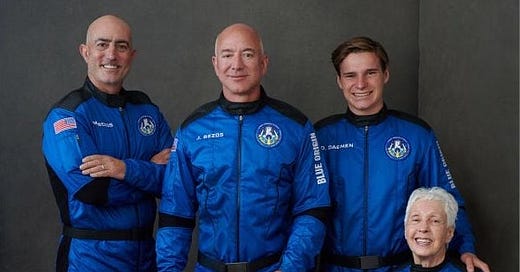It’s a tricky thing when you’re writing and reporting a newsletter about Amazon, perhaps especially when you’re writing about Amazon in a very broad sense as both a company and a cultural phenomenon, to avoig getting caught up in Amazon’s own news cycle. Amazon produces a lot of media fireworks that everyone is intended to chase: Prime Days is one of them, and Jeff Bezos’s side ventures like Blue Origin have been another. Even if your take on them is critical or humorous or dismissive, you’re talking about them. And that seems to be part of the point: they’re like countermeasures designed to baffle anyone who’d make other aspects of Amazon a target.
That at least, is part of what’s going on. But Blue Origin is a little different. (It’s not an Amazon project, for one thing; like the Washington Post, this is Bezos’s own thing.)
This is Blue Origin’s mission statement: “We're committed to building a road to space so our children can build the future.”
Blue Origin was founded by Jeff Bezos with the vision of enabling a future where millions of people are living and working in space to benefit Earth. In order to preserve Earth, Blue Origin believes that humanity will need to expand, explore, find new energy and material resources, and move industries that stress Earth into space. Blue is working on this today by developing partially and fully reusable launch vehicles that are safe, low cost and serve the needs of all civil, commercial and defense customers.
This is a weird paragraph. It starts with the biggest, wildest idea — the upshot — and then winds itself down to a very concrete, first-step vision of what that wild idea would look like in practice. Most paragraphs don’t work this way, except in nervously written student essays: usually, the writing builds to a crescendo, with the upshot usually coming at the end.
There have been essentially two critical approaches to understanding what Blue Origin’s mission is all about, both pretty cynical, but in different ways. The first sees the “vision” of millions of people living off-planet (the beginning of the paragraph) as a distraction; this is about money, plain and simple, the “civil, commercial, and [especially] defense customers” of the end of the paragraph. It doesn’t matter if barely dozens of people make it to space, so long as Blue Origin can get the contracts for those who do.
The second critical/cynical approach sees the end of the paragraph as a ruse, and the beginning as the company’s true goal: there are no real efforts here to democratize spaceflight by making it less expensive, so long as some people — certain wealthy and connected people — have a route off-planet if that becomes desirable and feasible. The planet is dying, and billionaires are looking for a parachute. It doesn’t matter how civilian spaceflight becomes possible, as long as dozens or maybe hundreds of people do (Blue Origin’s founders, investors, and customers first).
As always, I don’t know whether we’re being too cynical, not cynical enough, or cynical in the wrong direction. It’s quite possible, albeit paradoxical, that we’re simultaneously all three.
So, just what is going on in the middle of this paragraph?
In order to preserve Earth, Blue Origin believes that humanity will need to expand, explore, find new energy and material resources, and move industries that stress Earth into space.
This is even weirder. The core is four verb clauses, two of which have objects (find new energy and material resources, move industries) and two of which don’t (expand, explore). If you try to read “expand” or “explore” as applying to “industries” the whole sentence falls apart.
“Move industries that stress Earth into space” is pretty bizarre; both verb choices seem intentionally vague. But it does seem to suggest that Blue Origin (not unlike NASA) is as much about the industries that can be built around spaceflight as it is the big show of spaceflight (or near-spaceflight) itself. And the other nouns are just as important: energy and material resources.
So, suppose that’s the play: harvest, contribute, and (if possible) control the energy, material resources, and industrial tools and knowledge that enable human spaceflight, regardless of who the end customer is (civilian, commercial, or government) or who Blue Origin’s manufacturing and procurement partners might be.
That would be a very Amazon move — Blue Origin as a logistics company, an unavoidable in-between, a marketplace — as is offering as much as possible of the whole stack yourself, right down to the first group of commercial astronauts — Blue Origin as a well-known, well-trusted front face to an entire end-to-end process.
It may make more sense to combine the wry jokes about billionaires fleeing Earth with a closer look at just what Earth-bound supplies are being gathered together — not just money, but those all-too-scarce energy and material resources — to support these off-world expeditions, and try to explain what else we can do with them — the money, the energy, the rare materials, all of it.
That might turn out to be more important than who, if any of us, gets to leave Earth. Because what today’s launch, along with every human spaceflight launch ever made in more than sixty years of doing it, shows is that regardless of how many resources are put behind them, not one of us, no matter how rich, how famous, or how determined, is going to get very far.




